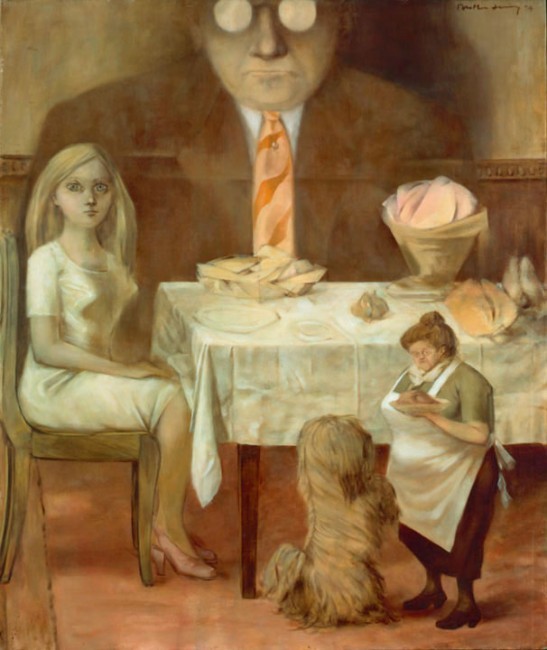
Portrait de famille (Family Portrait), 1954
Portrait de famille (Family Portrait)
1953-54
Oil on canvas
39 3/8 x 31 7/8 in.
Oil on canvas
39 3/8 x 31 7/8 in.
Musée National d'Art Moderne, Centre Georges Pompidou, Paris
" ....I've always been attracted by the fantastic. You see I was born in Galesburg, a hamlet of Illinois, which is nothing exciting in itself, but my father, of Swedish origin, a very authoritarian man ...
Marcel Duhamel: This is particularly evident in Family Portrait, where all the characters are represented in proportion to the importance they had then in your eyes. Looks like you settled accounts?
Not really ... It is more generally a comment on the hierarchy within the sacrosanct family. My father, despite everything, brought us a breath of exoticism. He told stories of distant snows, the fleeing boy skates on the ice, fast, fast ... the wolf at his heels ... I felt the hoarse wolf breath on my neck ... it was delicious.
[....J'ai toujours été attirée par le fantastique. Voyez-vous je suis née à Galesburg, un patelin de l'Illinois, ce qui n'a rien d'exaltant en soi, mais mon père, Suédois d'origine, homme très autoritaire ...
Marcel Duhamel: C'est particulièrement visible dans Portrait de famille, où tous les personnages sont représentés proportionnellement à l'importance qu'ils avaient
alors à vos yeux. On dirait que vous y réglez des comptes?
Pas vraiment... C'est plus généralement un commentaire sur la hiérarchie au sein de la Sacrosainte Famille. Mon père, malgré tout, nous apportait un souille d'exotisme. Il racontait des histoires de neiges lointaines, de garcon chaussé de patins fuyant sur la glace, vite, vite. Le loup à ses trousses ... Je sentais l'haleine rauque du loup sur ma nuque ... c'était délicieux.]
—from interview with Marcel Duhamel, Dorothea Tanning: Numéro Spécial de XXe Siècle. Paris: Editions XXe Siècle, 1977, p. 110.
Marcel Duhamel: This is particularly evident in Family Portrait, where all the characters are represented in proportion to the importance they had then in your eyes. Looks like you settled accounts?
Not really ... It is more generally a comment on the hierarchy within the sacrosanct family. My father, despite everything, brought us a breath of exoticism. He told stories of distant snows, the fleeing boy skates on the ice, fast, fast ... the wolf at his heels ... I felt the hoarse wolf breath on my neck ... it was delicious.
[....J'ai toujours été attirée par le fantastique. Voyez-vous je suis née à Galesburg, un patelin de l'Illinois, ce qui n'a rien d'exaltant en soi, mais mon père, Suédois d'origine, homme très autoritaire ...
Marcel Duhamel: C'est particulièrement visible dans Portrait de famille, où tous les personnages sont représentés proportionnellement à l'importance qu'ils avaient
alors à vos yeux. On dirait que vous y réglez des comptes?
Pas vraiment... C'est plus généralement un commentaire sur la hiérarchie au sein de la Sacrosainte Famille. Mon père, malgré tout, nous apportait un souille d'exotisme. Il racontait des histoires de neiges lointaines, de garcon chaussé de patins fuyant sur la glace, vite, vite. Le loup à ses trousses ... Je sentais l'haleine rauque du loup sur ma nuque ... c'était délicieux.]
—from interview with Marcel Duhamel, Dorothea Tanning: Numéro Spécial de XXe Siècle. Paris: Editions XXe Siècle, 1977, p. 110.
Source: http://www.dorotheatanning.org/

